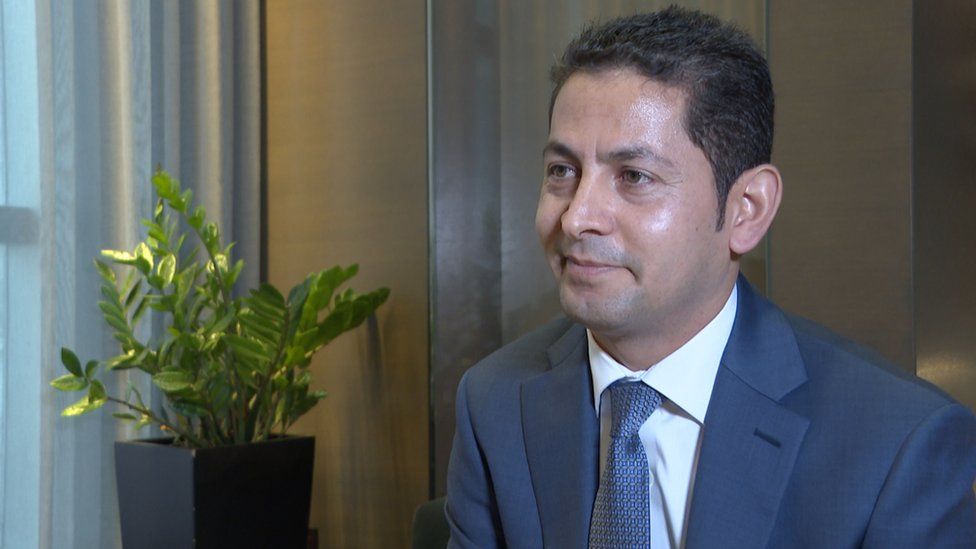ARTICLE AD BOX
By Natalie Sherman & Michelle Fleury
Business reporters, New York

Abdul Nasir Rahimi told the BBC finding a job had helped to restore his hopes
When Abdul Nasir Rahimi started his job hunt in the US, employers didn't quite know what to make of him: a former interpreter for the US military in Afghanistan with a law degree and experience overseeing major infrastructure projects.
He made little headway submitting his CV online. Finally at a job fair he managed to land a role as a security manager for the Hilton hotel company.
"I told them I'm not overqualified. I'm ready to work. I have to start from somewhere," the 36-year-old recalls.
As the flight of millions of people from Afghanistan and Ukraine push the world's refugee crisis to a brink, America's corporate world is starting to respond.
Hilton is among the more than 40 major companies, including Amazon, Pfizer and Pepsico, that pledged this week to hire nearly 23,000 refugees over the next three years - one of the biggest public commitments to date.
Their promises do not match the surge in new arrivals. But the interest from the business community marks a massive shift from just a few years ago, says billionaire US businessman Hamdi Ulukaya, the founder of the Chobani yogurt company, who started a non-profit in 2016 that works with firms to ease employment barriers for refugees and coordinated the promises.
"It's been a really slow start," said Mr Ulukaya, who said that anti-migrant "propaganda" during years that Donald Trump was president had slowed the willingness of companies to participate.
Hamdi Ulukaya made a fortune selling creamy Greek-style yogurt
Under Mr Trump, the US slashed its refugee allowance and all but closed its borders during the pandemic, admitting fewer than 12,000 refugees in 2020 and 2021.
That number is now on track to double - but it will fall far short of current President Joe Biden's 125,000 pledge.
Emergency programmes, which do not carry the same kind of financial support, have allowed another nearly 82,000 Afghans and over 100,000 Ukrainians to enter the US in recent months.
A spokesperson for the US State Department said the refugee programme was "decimated under the previous administration" and continues to feel the impact of staffing cuts and Covid.
"We are rebuilding it in a strategic, sustainable way that positions the program on a durable foundation for the future and modernizes the program to be responsive to evolving needs and opportunities," he said, adding that the government had "resumed refugee interviews in significant numbers".
Companies are turning to the new arrivals amid an outpouring of concern over the plight of Afghan and Ukrainian refugees, and an exceptionally tight US labour market that has made it hard to find workers.
"Demand for labour is really high and in many ways it's one of the most powerful factors," says Erica Bouris, director of economic empowerment for the International Rescue Committee, which has found that Afghan refugees helped by their organisation typically found jobs in about six months, earning an average hourly wage of about $17.
Jonas Prising says some firms remain hesitant
Though most of the new arrivals are authorised to work, many firms in the US remain concerned about getting entangled in complex visa situations, says Jonas Prising, chief executive of the staffing giant Manpower Group, which received some 13,000 applications from refugees in Europe and has placed 1,200 refugees in jobs there.
The company has also committed to finding work for 3,000 refugees in the US.
"The business case for hiring refugees is very, very strong. And it is the right thing to do," he says. "What's a little bit different if you compared to the this to the reaction in Europe, is that the complexities around the work permit, and how this is facilitated by the government... still is complex.
"A lot of businesses are still hesitant here in the US. Although they have the intention to hire, they don't really know how," he says.
Today, Mr Ulukaya's Tent Partnership for Refugees works with some 260 companies around the world, providing advice on everything from visa rules to suggestions about helping new arrivals find transportation to get to the new jobs. But until relatively recently much of their work was focused outside the US.
"Companies need to play a role in this," says Mr Ulukaya, but he also knows the renewed interest could crumble.
"This level of participation and willingness to be part of solving this... is very fragile," he says. "That's why it's a great responsibility for us... to make sure that we take advantage of this moment."

 2 years ago
78
2 years ago
78








 English (US) ·
English (US) ·